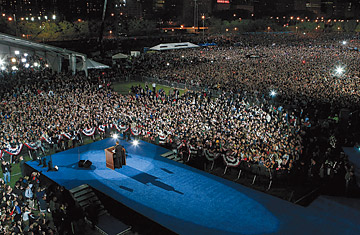
The scene in Chicago during the exuberance of election night 2008.
(4 of 5)
The public mood on economics today is a lot like the public mood on culture 40 years ago: Americans want government to impose law and order--to keep their 401(k)s from going down, to keep their health-care premiums from going up, to keep their jobs from going overseas--and they don't much care whose heads Washington has to bash to do it.
Seizing the Moment
That is both Obama's great challenge and his great opportunity. If he can do what F.D.R. did--make American capitalism stabler and less savage--he will establish a Democratic majority that dominates U.S. politics for a generation. And despite the daunting problems he inherits, he's got an excellent chance. For one thing, taking aggressive action to stimulate the economy, regulate the financial industry and shore up the American welfare state won't divide his political coalition; it will divide the other side. On domestic economics, Democrats up and down the class ladder mostly agree. Even among Democratic Party economists, the divide that existed during the Clinton years between deficit hawks like Robert Rubin and free spenders like Robert Reich has largely evaporated, as everyone has embraced a bigger government role. Today it's Republicans who--though more unified on cultural issues--are split badly between upscale business types who want government out of the way and pro-government conservatives who want Washington's help. If Obama moves forcefully to restore economic order, the Wall Street Journal will squawk about creeping socialism, as it did in F.D.R.'s day, but many downscale Republicans will cheer. It's these working-class Reagan Democrats who could become tomorrow's Obama Republicans--a key component of a new liberal majority--if he alleviates their economic fears.
Obama doesn't have to turn the economy around overnight. After all, Roosevelt hadn't ended the Depression by 1936. Obama just needs modest economic improvement by the time he starts running for re-election and an image as someone relentlessly focused on fixing America's economic woes. In allocating his time in his first months as President, he should remember what voters told exit pollsters they cared about most--63% said the economy. (No other issue even exceeded 10%.)
In politics, crisis often brings opportunity. If Obama restores some measure of economic order, kick-starting U.S. capitalism and softening its hard edges, and if he develops the kind of personal rapport with ordinary Americans that F.D.R. and Reagan had--and he has the communication skills to do it--liberals will probably hold sway in Washington until Sasha and Malia have kids. As that happens, the arguments that have framed economic debate in recent times--for large upper-income tax cuts or the partial privatization of Social Security and Medicare--will fade into irrelevance. In an era of liberal hegemony, they will seem as archaic as defending the welfare system became when conservatives were on top.
A New Consensus
